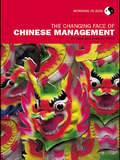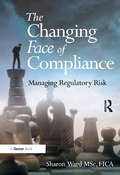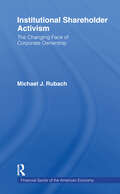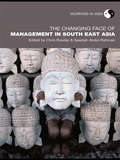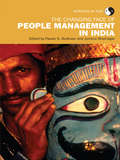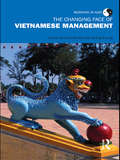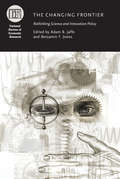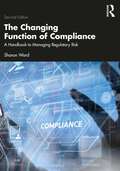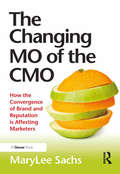- Table View
- List View
The Changing Face of Angel Investing
by William A. Sahlman Evan RichardsonAngel investors Ram Shriram, Mike Maples, Eric Paley, James Geshweiler, and Jim Southern discuss their investment philosophies and the changing landscape of angel investing. Questions include: How has angel investing changed in the last few years? How do you evaluate a prospective investment's attractiveness? How do you think about risk and reward in angel investing? Is it possible for Angel funds to be too big?
The Changing Face of Chinese Management
by Tang Jie Anthony WardChinese management has experienced a dramatic change in recent years. In many areas, established ideas about how Chinese management operates are oversimplified and outdated. This book sets out to provide a more realistic portrait of Chinese management today, and how it has changed dramatically over the past ten years. The portrait of contemporary Chinese management draws on extensive interviews with Chinese managers conducted by the authors. These provide a wealth of concrete illustrations of how managers deal on a daily basis with the opportunities and threats they face.
The Changing Face of Compliance: Managing Regulatory Risk
by Sharon WardIn the current business climate the impact of the volume and nature of regulatory change and the regulatory risk arising from this is a significant business risk for regulated firms and regulators alike. As a consequence, management of this risk is increasingly high on the board agenda of regulated firms, with those business functions whose activities support this, such as Compliance, facing increasing levels of challenge in their efforts to be effective. The Changing Face of Compliance addresses core aspects of this challenge, considering the relationship between regulation and compliance and key influences on both, offering insight into the effectiveness of current approaches and addressing practical compliance challenges. Sharon Ward explains how the role of Compliance might be strengthened and those who work within it further enabled to support the current focus on improving standards in business, offering recommendations for enhancing this role. The text includes a mix of hands-on advice, examples and research based on the experiences of practitioners, educators and regulators drawn from across a wide range of jurisdictions and sectors. This is a thoughtful and timely book, whether you are concerned about the growing and changing implications of regulatory risk; the benefit of leveraging additional value from your Compliance function or your own Compliance role; or ways of transforming and sustaining the function to ensure its continued relevance to the business.
The Changing Face of Corporate Ownership: Do Institutional Owners Affect Firm Performance (Financial Sector Of The American Economy Ser.)
by Michael J. RubachFirst Published in 2000. This book examines the shareholder activism of institutional investors and the effect of shareholder activism on portfolio performance. Institutional shareholder activism includes both traditional mechanisms of influence (e.g., filing shareholder proposals) and relationship investing (e.g., long-term interorganizational contacts between owners and a corporation’s top managers).
The Changing Face of Corporate Ownership: Do Institutional Owners Affect Firm Performance (Financial Sector of the American Economy)
by Michael J. RubachFirst Published in 2000. Routledge is an imprint of Taylor & Francis, an informa company.
The Changing Face of Imperialism: Colonialism to Contemporary Capitalism
by Sunanda Sen Maria Cristina MarcuzzoThis volume reiterates the relevance of imperialism in the present, as a continuous arrangement, from the early years of empire-colonies to the prevailing pattern of expropriation across the globe. While imperialism as an arrangement of exploitation has sustained over ages, measures deployed to achieve the goals have gone through variations, depending on the network of the prevailing power structure. Providing a historical as well as a conceptual account of imperialism in its ‘classical’ context, this collection brings to the fore an underlying unity which runs across the diverse pattern of imperialist order over time. Dealing with theory, the past and the contemporary, the study concludes by delving into the current conjuncture in Latin America, the United States and Asia. The Changing Face of Imperialism will provide fresh ideas for future research into the shifting patterns of expropriation – spanning the early years of sea-borne plunder and the empire-colonies of nineteenth-century to contemporary capitalism, which is rooted in neoliberalism, globalization and free market ideology. With contributions from major experts in the field, this book will be a significant intervention. It will be of interest to scholars and researchers of economics, politics, sociology and history, especially those dealing with imperial history and colonialism.
The Changing Face of Japanese Management (Working in Asia)
by Keith Jackson Miyuki TomiokaFor many western managers the approach taken by successful Japanese organisations and their managers has tended to inspire awe, envy and incomprehension in equal measure. But what is so special about 'Japanese' management? And how 'special' is the response of Japanese managers to global business pressures ? This textbook addresses these questions. It presents case examples generated from interviews with Japanese managers in Japan, Europe and the USA, contextualising their comments by reference to recent research in the fields of international and intercultural management. The book explains how and why individual managers variously perceive threats or opportunities in the business and career environments currently evolving both inside and outside Japan. It combines vivid images of the expected and the exceptional, the traditional with the new and unfamiliar.The Changing Face of Japanese Management offers management students with little prior knowledge of Japanese business and society, critical insights into what is happening inside Japanese management today. It also offers clear and immediately transferable insights to management practitioners who are preparing to work or negotiate with Japanese business partners.
The Changing Face of Korean Management (Working in Asia)
by Chris RowleyPart of the successful Routledge ‘Working in Asia’ series, The Changing Face of Korean Management focuses on a country that is predicted by some experts to become the world’s third richest by 2025. South Korea, with its thriving telecommunications and automotive industries, and increasing trade links with China, survived the 1997 Asian Economic Crisis better than most. This important textbook explores the key areas of management in this pivotal country in the region, including: Human Resource Management Marketing Operations Finance Strategy Overseas affiliates Small firms and entrepreneurship Women Including case studies and interviews with front-line Korean managers to enable a real ‘voice’ to emerge, and written by native academics, this is a complete analysis of the current state of management structures in South Korea. It is important reading for all students of business and management interested in Asia.
The Changing Face of Management in China (Working in Asia)
by Fang Lee Cooke Chris RowleyChina is one of the fastest developing emerging economies in the world today. The country has a huge influence on a global level, both politically and economically. Despite this, very few books cover both the full range of management functions, and the key issues facing managers in this unique business environment. The Changing Face of Management in China explores the key challenges facing businesses and managers in China, across management functions, as well as across a range of sectors and organization types. Written by prominent scholars with direct experience in this market, this book adds to the existing body of knowledge by examining a range of areas of Chinese management in the context of local political, economic and social traditions, and the global economy. Part of the successful Working in Asia series, this book includes case studies that allow the voices of local managers to be heard, as well as extensive bibliographies pointing students and researchers to the most up-to-date sources of information in this important area.
The Changing Face of Management in South East Asia (Working in Asia)
by Chris Rowley Saaidah Abdul-RahmanSouth East Asia has undergone important economic, social and political developments in the last decade. The emergence of China as Asia’s largest pool of cheap labour has resulted in remarkable changes in the volume of foreign direct investment it commands, while the 1997 Asian Financial Crisis has undoubtedly influenced managerial practices in the majority of the countries in the region. In response, South East Asian governments and businesses have sought ways of attracting new investors while intensifying their efforts to retain existing industries. This important new volume overviews the development of South East Asian management practices, focusing on human resource management (HRM) as an indicator and measure of change. Written by prominent scholars of the region, the book focuses on reform in the human resource (HR) managerial domain, documenting recent changes and assessing current practices from both macro and micro perspectives. A consistent structure and content is used throughout, with each chapter incorporating ‘real-life’ local organizational and manager case studies, plus vignettes to give ‘voice’ to practitioners and developments. This is essential reading for anybody with an interest in management, HR or the political, social, cultural and economic profiles of the countries of South East Asia.
The Changing Face of Management in Thailand (Working in Asia)
by Tim Andrews Sununta SiengthaiIn the decade following the Asian financial crisis of 1997-1998, the management of organizations in Thailand has undergone significant change and development. The Changing Face of Management in Thailand examines in-depth the development of management during this pivotal period in the country’s recent history. The book draws together an impressive assortment of scholars, consultants and practitioners, whose experience and expertise significantly enhance our knowledge and understanding of this complex, multi-faceted Asian economy. The book is divided into 3 main sections: an examination of the political, economic, social and technological changes from 1997-2008 specialist chapters that contextualise these developments from the marketing, HR and finance perspectives concluding sections focusing on public sector organizations, women managers, corporate governance, e-communication and the ‘Thailand Brand’. With a wealth of vignettes, anecdotes and illustrative quotations bringing each chapter to life, this volume offers a refreshing, updated and in-depth analysis of this rich, diverse and fascinating nation.
The Changing Face of Multinationals in South East Asia
by Tim Andrews Bryan J. Baldwin Nartnalin ChompusriThis book examines how and why corporate strategy, structure and culture is continuing to change markedly in South East Asia. Among the issues that have forced widespread changes in the region are the economic meltdown, the growth in electronic technology, regional market integration, changing levels of education, business process standardisation a
The Changing Face of People Management in India (Working in Asia)
by Pawan S. Budhwar Jyotsna BhatnagarIndia has been identified as one of the biggest emerging markets in the world. Indian organizations have increasingly begun to understand the importance of human resources and have started to take into account the motivation, commitment and morale of its workforce. Despite great advances in human resource practices in India, the relevant literature on this subject remains scarce. This book seeks to fill the critical gap in the literature by providing a thorough understanding of the changing face of Indian HRM systems. Seeking to provide a comprehensive overview of Indian HRM practices, the book is structured into five parts: Developments in Indian HRM Determinants of Indian HRM Sector specific HRM Emerging themes Future challenges and the way forward The Changing Face of People Management in India is written exclusively by Indian natives in order to minimise the Western bias and to provide a realistic picture of HRM practices in India. This book is a key resource for anyone studying or working in HRM or international business or with an interest in the unique Indian HRM context.
The Changing Face of Vietnamese Management (Working in Asia)
by Chris Rowley Quang TruongVietnam has emerged from long periods of colonialization, wars and ideological conflicts to become an important economic force within Asia and a promising destination for international business ventures. The latest book in the popular Working in Asia series, The Changing Face of Vietnamese Management, draws on the experiences of local, Vietnamese experts to offer a unique perspective on the opportunities, challenges and issues facing managers and organizations operating in this fascinating emerging market. The book: Contextualizes political, economic and social traditions Discusses Vietnam’s competitiveness within the global economy Analyzes key functional areas, including HRM, marketing, finance and strategy Examines key issues and new developments in management and business This key text includes illustrative case studies and vignettes to provide broad coverage and content that would serve the needs of students and managers alike.
The Changing Face of Women Managers in Asia (Working in Asia)
by Chris Rowley Vimolwan YukongdiThe influence of Asian cultures and religious traditions has often been used to explain Asian women’s under-utilisation and under-representation in management. This book examines the influence of culture and tradition on organisational and management practices, and how these affect the progress of women in management in Asian economies. This book, written by prominent scholars of the Asian region, explores which organizational and management practices are universal, and which other aspects (such as human resource practices) are culture specific, and how these in turn affect the advancement / representation of women in the Asian region. Higher educational levels, falling fertility rates and sectoral changes have contributed to women’s increasing participation in the labour force. As women become more educated and qualified for managerial positions, the number of Asian women managers and executives is predicted to rise over the next decade. The Asian economies covered by this up-to-date collection have undergone rapid economic transformation. Until now, most research on contemporary women managers has been drawn from studies conducted in developed countries. Covering case studies in China, Hong Kong, Japan, Malaysia, Singapore, South Korea, Taiwan, Thailand and Vietnam, this book uses different perspectives to examine the constraints, opportunities and challenges for women managers in the Asian context and presents an update on their progress in management.
The Changing Financial Landscape: Financial Performance Analysis of Real and Banking Sectors in Europe (Contributions to Economics)
by Anastasios Karasavvoglou Persefoni Polychronidou Goran KaranovicThis book offers new insights and perspectives on the financial and banking sector in Europe with a special focus on Central and Southeastern European countries. Through quantitative and qualitative analysis of primary sources and datasets, the book examines both the financial development and performance of the real sector of the economy and the impact and involvement of the banking sector. The contributions offer new insights into current financial innovations and discuss best practices in innovative financial solutions. They also highlight new perspectives in finance and analyze characteristic problems in the real and banking sectors in various European countries. The insights and financial solutions presented in this book will be of interest to scholars of finance and financial economics as well as practitioners in the financial industry and policy makers.
The Changing Fortunes of Central Banking
by Haizhou Huang Dirk Schoenmaker Philipp HartmannUnderstanding the changing role of central banks and the novel policies they have pursued recently is absolutely essential for analysing many economic, financial and political issues, ranging from financial regulation and crisis, to exchange rate dynamics and regime changes, and QE and prolonged low interest rates. This book features contributions by many of the world’s leading experts on central banking, providing in accessible essays a fascinating review of today’s key policy and research issues for central banks. Luminaries including Stephen Cecchetti, Takatoshi Ito, Anil Kashyap, Mervyn King, Donald Kohn, Otmar Issing, Hyun Shin and William White are joined by Charles Goodhart of the London School of Economics, whose many achievements in the field of central banking are honoured as the inspiration for this book. The Changing Fortunes of Central Banking discusses the developing role of central banks and the policies they pursue in seeking monetary and financial stabilisation, while also giving suggestions for model strategies. This comprehensive review will appeal to central bankers, financial supervisors, academics and economists working in think tanks.
The Changing Frontier: Rethinking Science and Innovation Policy (National Bureau of Economic Research Conference Report)
by Adam B. Jaffe Benjamin F. JonesIn 1945, Vannevar Bush, founder of Raytheon and one-time engineering dean at MIT, delivered a report to the president of the United States that argued for the importance of public support for science, and the importance of science for the future of the nation. The report, Science: The Endless Frontier, set America on a path toward strong and well-funded institutions of science, creating an intellectual architecture that still defines scientific endeavor today. In The Changing Frontier, Adam B. Jaffe and Benjamin Jones bring together a group of prominent scholars to consider the changes in science and innovation in the ensuing decades. The contributors take on such topics as changes in the organization of scientific research, the geography of innovation, modes of entrepreneurship, and the structure of research institutions and linkages between science and innovation. An important analysis of where science stands today, The Changing Frontier will be invaluable to practitioners and policy makers alike.
The Changing Function of Compliance: A Handbook to Managing Regulatory Risk
by Sharon WardAs risks arising within the business environment grow in size and complexity, so too do the regulatory requirements put in place to manage them. The pace of regulatory change is itself a significant business risk, and compliance departments are under increasing pressure to keep up with the change and adapt their organisations accordingly. This new edition of what has become an indispensable guide to regulation compliance brings readers up to date with changing areas of focus and provides guidance for regulated firms and regulators alike. The Changing Function of Compliance considers the relationship between regulation and compliance as well as key influences on both, offering insight into the effectiveness of current approaches and addressing practical compliance challenges. It explains the purpose and development of regulatory risk management and the existing regulatory environment, and provides a detailed exploration of the compliance function, explaining how the role might be strengthened and how best to approach the role to enable it to be effective. This practical and accessible handbook includes a mix of hands-on advice, examples and research based on the experiences of practitioners, educators and regulators drawn from across a wide range of jurisdictions and sectors. This book is an essential read, whether you are concerned about the growing and changing implications of regulatory risk, the benefit of leveraging additional value from your compliance function or your own compliance role or ways of transforming and sustaining the function to ensure its continued relevance to the business.
The Changing Geography of Banking and Finance
by Michele Fratianni Alberto Zazzaro Pietro AlessandriniThe editors and contributors tackle a timely subject, and present rigorous research and analysis to demonstrate counter-intuitive results. In so doing, they reinforce the connections between organization and policy in the banking industry and its impact on entrepreneurship, through lending and credit to small and medium-sized businesses. The editors present a carefully organized manuscript that presents both literature reviews and the results of original empirical research that will be of interest to academics and professionals in finance, economics, and policy. The authorship and coverage are global. One of the authors, Michele Fratiani, has close ties to Springer, by virtue of his being a founding editor of Open Economies Review and co-editor of the book series, European and Transatlantic Studies.
The Changing Geography of International Business
by Gary Cook Jennifer JohnsPresents papers which grapple with some of the most important developments and challenges in International Business, both for the firms who must fashion strategy within a rapidly changing world economic order and researchers who seek to explain the nature of these shifts and how firms respond.
The Changing Japanese Labor Market: Theory And Evidence (Advances in Japanese Business and Economics #12)
by Akiomi Kitagawa Souichi Ohta Hiroshi TeruyamaThis book reappraises the Japanese employment system, characterized by such practices as the periodic recruiting of new graduates, lifetime employment and seniority-based wages, which were praised as sources of high productivity and flexibility for Japanese firms during the period of high economic growth from the middle of the 1950s until the burst of bubbles in the early 1990s. The prolonged stagnation after the bubble burst induced an increasing number of people to criticize the Japanese employment system as a barrier to the structural changes needed to allow the economy to adjust to the new environment, with detractors suggesting that such a system only serves to protect the vested interests of incumbent workers and firms. By investigating what caused the long stagnation of the Japanese economy, this book examines the validity of this currently dominant view about the Japanese employment system. The rigorous theoretical and empirical analyses presented in this book provide readers with deep insights into the nature of the current Japanese labor market and its macroeconomic impacts.
The Changing MO of the CMO: How the Convergence of Brand and Reputation is Affecting Marketers
by MaryLee SachsMaryLee Sachs explores the relationship and increasing blur between the marketing discipline and the public relations profession. How do the two mix? What is their role in a world where the growth of digital and social media has contributed to an increasing lack of control over how brands are perceived? Drawing on the experiences of Chief Marketing Officers (CMOs) from 10 iconic organizations with business and consumer brands across the globe, The Changing MO of the CMO explores how some organizations are making the most of a blended approach to communications and marketing and how CMOs can respond to and prepare for their new responsibilities. It illustrates how PR can provide: ¢ authenticity, relevance and advocacy to marketing; ¢ integration of an organization's approach to paid, owned and earned media channels; ¢ a strategic risk management tool for assuring reputation and managing crisis communication. Changing the traditional roles of marketing and communications may be an imperative for organizations. That doesn't make it easy. This readable and credible short guide provides a sense of the opportunities and obstacles involved and the vision required to change the culture of marketing and communications. The Changing MO of the CMO is an important book for developing a new model of marketing; it should be read by all CMOs charged with defining and implementing changes.
The Changing Nature of Corporate Social Responsibility: CSR and Development – The Case of Mauritius (Routledge Research in Corporate Law)
by Renginee PillayCorporate Social Responsibility (CSR) has increasingly been promoted as an important mechanism for furthering economic and social development goals in developing countries. In such an optimistic climate, questions arise as to whether CSR can bear the weight of the increasing expectations being heaped on its shoulders. This book examines the changing nature of corporate social responsibility as it has been conceived over the past eighty years. It considers the historical and socio-legal developments of the idea of CSR and the various conceptions of the corporation which underlie different realisations of CSR. The book explores the model of CSR deployed in the developing world as well as the links between CSR and development. Renginee Pillay uses Mauritius as a case-study, demonstrating how CSR and corporate governance issues have come to the fore of political, financial and legal landscapes. Drawing on empirical research, the book examines how the first legislation of its kind has been implemented in Mauritius, and analyses its impact on development. In its work to evaluate the contribution CSR can make to development, this book will be of great use and interest to students and researchers of business and company law, business ethics, and development studies.
The Changing Nature of Doing Business in Transition Economies
by Svetla Marinova Marin MarinovStaying at the pinnacle of the advancing business development of transition economies and the impact of changing business conditions is a challenging task for all firms wanting to do business in them. This book provides insight into the way in which businesses function with a comprehensive overview of the major aspects involved.

